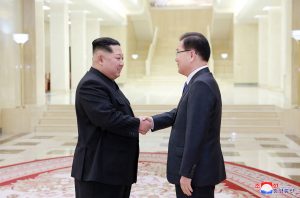
North Korean leader Kim Jung Un has expressed a willingness to discuss nuclear disarmament with the United States and impose a moratorium on nuclear and missile tests during such talks, a senior South Korean official said Tuesday after returning from the North.
Kim also agreed to meet with South Korea’s president at a tense border village in late April, presidential national security director Chung Eui-yong said after talks with Kim in Pyongyang, North Korea’s capital.
North Korea’s reported willingness to hold a “candid dialogue” with the United States to discuss denuclearization and establish diplomatic relations follows a year of increased fears of war on the Korean Peninsula, with Kim and U.S. President Donald Trump exchanging fiery rhetoric and crude insults over Kim’s barrage of weapons tests.
The Trump administration also pushed through some of the harshest sanctions the already hugely sanctioned North has yet faced.
Trump tweeted Tuesday that “possible progress” was being made in the talks with North Korea, and that all sides were making serious efforts. He added: “May be false hope, but the U.S. is ready to go hard in either direction!”
There is still skepticism whether the developments will help establish genuine peace between the Koreas, which have a long history of failing to follow through with major rapprochement agreements. The United States has made it clear that it doesn’t want empty talks with North Korea and that all options, including military measures, remain on the table.
The North has repeatedly said in the past that it won’t negotiate over its nuclear program and vowed to bolster its nuclear and missile arsenals. Its apparent about-face might be an attempt to win concessions as its economy struggles under the weight of sanctions, some analysts said, or a way to buy time to better develop nuclear missiles targeting the mainland United States.
Many experts believe North Korea won’t easily give up a nuclear program that it has doggedly developed, despite years of escalating international pressure, to cope with what it claims is U.S. hostility.
Chung led a 10-member South Korean delegation on a two-day visit to North Korea. They were the first South Korean officials to meet the young North Korean leader since he took power after his dictator father’s death in late 2011. Chung’s trip also was the first known high-level visit by South Korean officials to North Korea in about 11 years.
It followed a series of cooperative steps taken by the Koreas during last month’s Pyeongchang Winter Olympics hosted by South Korea.
If talks with the United States happen, Chung said North Korea “made it clear that it won’t resume strategic provocations like additional nuclear tests or test-launches of ballistic missiles” while the talks continue.
North Korea told the South Korean envoys that it would not need to keep its nuclear weapons if military threats against it are removed and it receives a credible security guarantee, Chung said. He said the North promised not to use its nuclear and conventional weapons against South Korea.
Kim also said he “understands” that contentious annual military drills by the U.S. and South Korea will take place in April at a scale similar to previous years and expressed hope that they could be modified once the situation on the Korean Peninsula stabilizes, according to a senior South Korean presidential official, who didn’t want to be named, citing office rules.
Chung said the two Koreas agreed to hold their summit at a Seoul-controlled facility inside the border village. He also said Kim and liberal South Korean President Moon Jae-in will establish a “hotline” communication channel between them to lower military tensions, and would speak together before the planned summit.
If realized, the summit between the countries’ leaders would be the third-ever since the Koreas’ 1945 division. The two past summits, in 2000 and 2007, were both in Pyongyang and were held between Kim’s late father, Kim Jong Il, and two liberal South Korean presidents. They resulted in a series of cooperative projects that were scuttled during subsequent conservative administrations in South Korea.
Analyst Cheong Seong-Chang at South Korea’s Sejong Institute said the agreements “potentially pave the way for meaningful dialogue between Washington and Pyongyang” and could offer an opportunity to stably manage the threat posed by North Korea’s nuclear weapon and missile programs.
“Getting North Korea to agree to halt additional nuclear weapons and missile tests while the dialogue goes on is the biggest achievement of the visit to Pyongyang by the South Korean presidential envoys,” he said.




